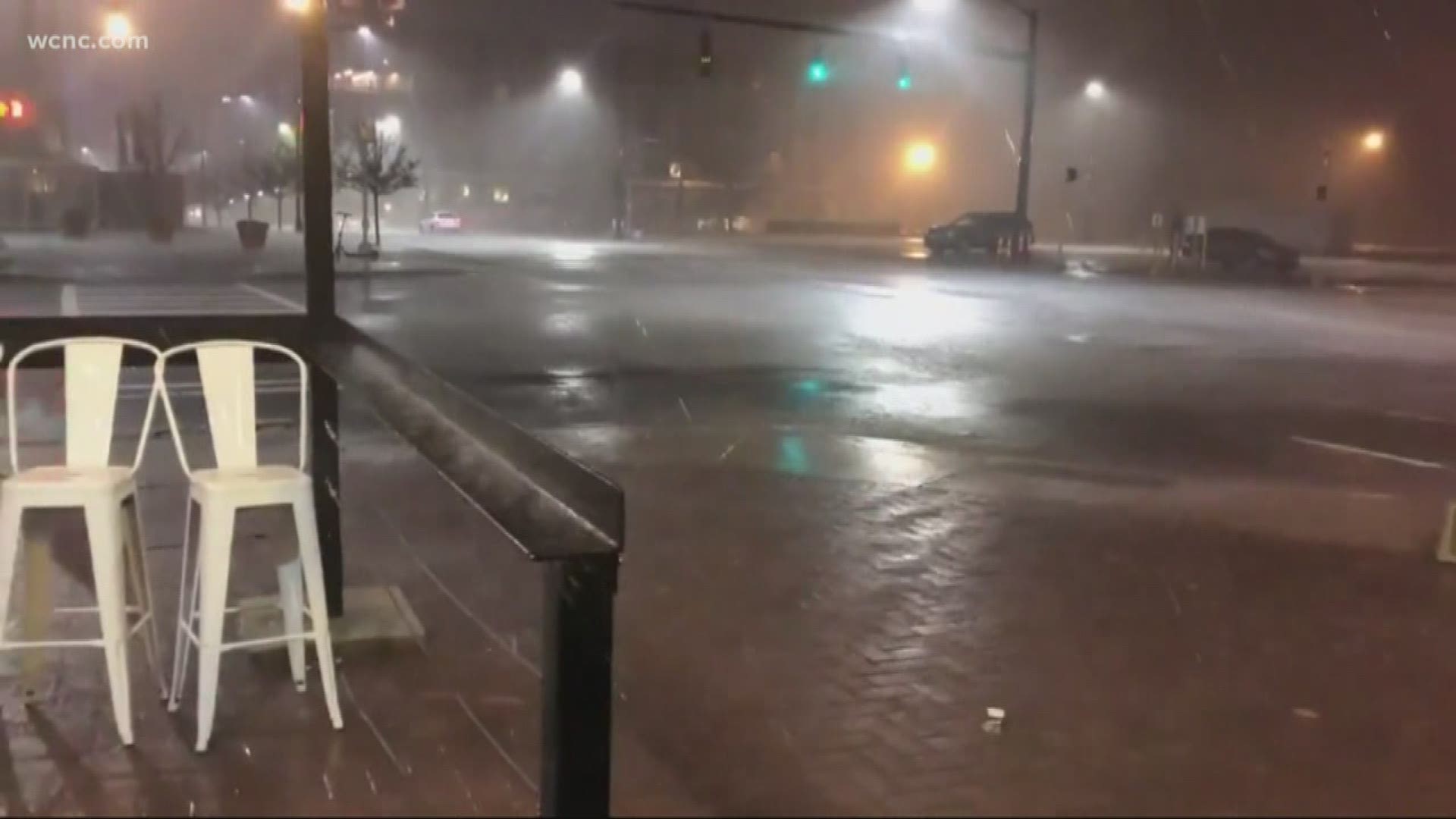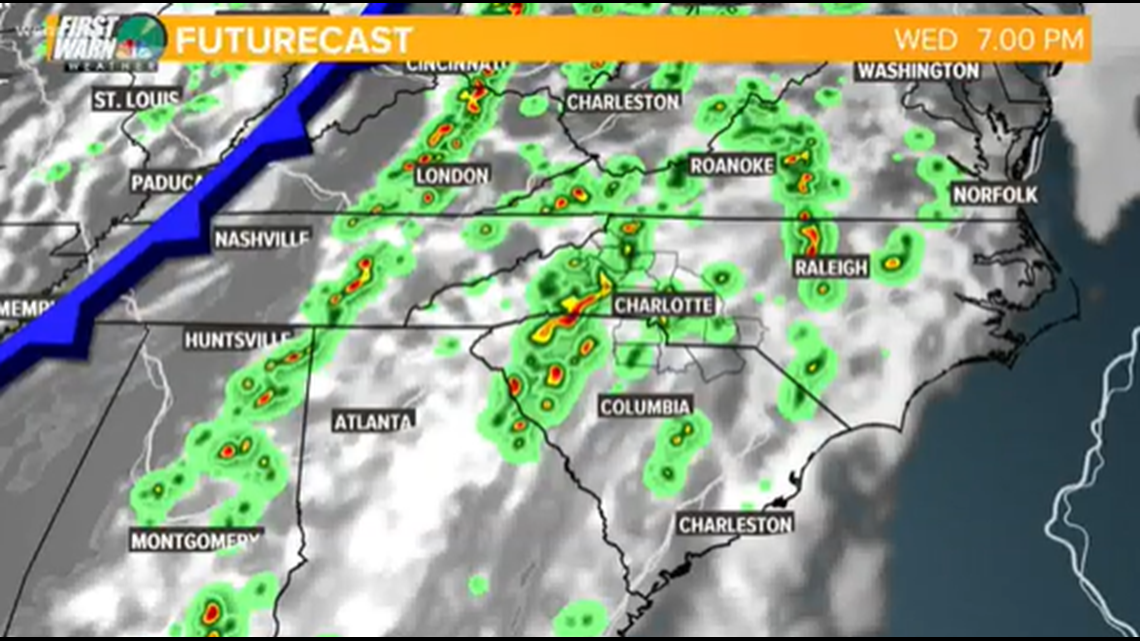Table Of Content

The month with the most snow in Charlotte is January, with an average snowfall of 2.8 inches. The figure below shows you a compact characterization of the entire year of hourly average temperatures. The horizontal axis is the day of the year, the vertical axis is the hour of the day, and the color is the average temperature for that hour and day. In Charlotte in November, there's a 23% chance of rain on an average day. And on the average day it rains or snows, we get 0.53 in (13.5 mm) of precipitation. In more common terms of how much that is, some would describe it as moderate rain.
East Fork of San Jacinto River to crest, but more rain on the way
The new parts are also less durable, lasting just four races or so, compared with the 10 races that the parts in the previous cars lasted for. The Next Gen cars have carbon fiber bodies that are more durable but cannot be repaired when damaged, unlike the metal bodies of the older cars, which could be welded and repurposed. Teams must now buy a minimum number of tires, which can cost more than a $1 million a season. Unlike the National Basketball Association, the National Football League and most other sports leagues, NASCAR is a privately held business that is tightly controlled by the France and Kennedy families.
Average rainfall Charlotte, NC
The hottest month of the year in Charlotte is July, with an average high of 89°F and low of 71°F. This graph shows the average amount of daylight in Charlotte in November based on historical data. The growing season in Charlotte typically lasts for 7.5 months (231 days), from around March 21 to around November 7, rarely starting before March 2 or after April 11, and rarely ending before October 19 or after November 27.
Average Monthly Rainfall in November in Charlotte
While not too hot, the summer in Charlotte can be brutally muggy, especially in the middle of July when both the humidity and temperature reach their peak. Unfortunately, muggy days also mean muggy nights because the dew point keeps humidity levels from dropping even as the temperatures do. On average, spring is one of the best times to visit Charlotte, especially the later in the season you can plan your trip. While March starts out with a chilly high of 59 degrees Fahrenheit, the city warms up by the end of May to a pleasant average high of 81 degrees.
The clearer part of the year in Charlotte begins around July 31 and lasts for 3.7 months, ending around November 22. The details of the data sources used for this report can be found on the Charlotte Douglas International Airport page. We recognize our responsibility to use data and technology for good. Trust us to help you plan the best day possible, with the most accurate weather forecast available. The months with the highest visibility are January, February, March, April, May, June, July, August, September, October, November and December (6mi).
The worst time to visit Charlotte
In Charlotte, the summers are hot and muggy, the winters are very cold and wet, and it is partly cloudy year round. Over the course of the year, the temperature typically varies from 33°F to 89°F and is rarely below 21°F or above 96°F. The month with the highest number of snowfall days is February (1.7 days). The months with the least snowfall days are April, May, June, July, August, September, October and November (0 days).

The wind is most often from the south for 1.2 months, from March 16 to April 21, with a peak percentage of 32% on April 17. The wind is most often from the west for 3.7 months, from April 21 to August 11 and for 1.1 months, from December 26 to February 2, with a peak percentage of 36% on July 3. The month with the fewest muggy days in Charlotte is February, with 0.0 days that are muggy or worse.
Yosemite National Park is definitely worth a visit
Charlotte experiences some seasonal variation in monthly rainfall. Among wet days, we distinguish between those that experience rain alone, snow alone, or a mixture of the two. The month with the most days of rain alone in Charlotte is July, with an average of 13.1 days.
In Charlotte, the average percentage of the sky covered by clouds experiences mild seasonal variation over the course of the year. There are 3 weather stations near enough to contribute to our estimation of the temperature and dew point in Charlotte. The chance that a given day will be muggy in Charlotte is gradually decreasing during November, falling from 2% to 0% over the course of the month. To show variation within the month and not just the monthly total, we show the rainfall accumulated over a sliding 31-day period centered around each day.
Per the criteria of what qualifies as a hurricane, Hugo sustained hurricane-strength winds until shortly after it passed west of Charlotte. While Charlotte sees an average overall high temperature of 71 degrees Fahrenheit and an average low temperature of 49, winter months usually bring temperatures in the 30 to 60-degree range, while summers see 60 to 90 degrees Fahrenheit. Additionally, while August may be the rainiest month of the year at just over 4.2 inches total accumulation, Charlotte sees around three to four inches of rain per month year-round. The beach/pool score favors clear, rainless days with perceived temperatures between 75°F and 90°F.
NASCAR is the sanctioning body for the sport, but it also owns many of the tracks where the races are held and sells its own national sponsorships and broadcast deals. After the home was cleared, the helicopter pilot said he couldn’t show the front lawn of the home because the scene was too graphic and disturbing. WSOC-TV said their helicopter captured an armored vehicle driving through yards and knocking over recycling bins before officers removed a person with blood on their shirt who was then loaded into an ambulance. A second person then fired on officers from inside the home where a high-powered rifle was found, Jennings added.
The vertical gray bars (new Moons) and blue bars (full Moons) indicate key Moon phases. Daylight saving time (DST) is observed in Charlotte during 2024, starting in the spring on March 10, lasting 7.8 months, and ending in the fall on November 3. The cloudiest month of the year in Charlotte is January, during which on average the sky is overcast or mostly cloudy 49% of the time.
Please note that each source's contribution is adjusted for elevation and the relative change present in the MERRA-2 data. This report illustrates the typical weather in Charlotte, based on a statistical analysis of historical hourly weather reports and model reconstructions from January 1, 1980 to December 31, 2016. During November in Charlotte, the chance that a given day is within the growing season is very rapidly decreasing falling from 67% to 7% over the course of the month. Over the course of November in Charlotte, the length of the day is decreasing. From the start to the end of the month, the length of the day decreases by 45 minutes, implying an average daily decrease of 1 minute, 33 seconds, and weekly decrease of 10 minutes, 50 seconds. The month of November in Charlotte experiences gradually increasing cloud cover, with the percentage of time that the sky is overcast or mostly cloudy increasing from 38% to 45%.
What to expect for the holiday season in Charlotte - WCNC.com
What to expect for the holiday season in Charlotte.
Posted: Wed, 22 Nov 2023 08:00:00 GMT [source]
The month with the most cloud cover is February (Cloud cover 43). The month with the highest average low temperature is July (70.3°F). The coldest month (with the lowest average low temperature) is January (33.3°F).
Meanwhile, the low averages range from 39 to 62, meaning you won't likely experience frigid temperatures, especially in April and May. Still, you should be prepared for rain throughout the season since each month experiences roughly seven to 10 days of rainfall—with the most occurring in April and May. The average hourly wind speed in Charlotte experiences mild seasonal variation over the course of the year.
The CMPD's Special Weapons and Tactics Team (SWAT) then began negotiations with other occupants in the house. That included armored vehicles crashing into the suburban home in a tree-lined neighborhood and tearing off doorways and windows. The man shooting at the officers left the home and was killed in the front yard of the home in the eastern Charlotte neighborhood.

No comments:
Post a Comment